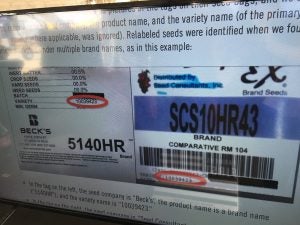Seed relabeling is relatively common knowledge in the ag world, but there’s been little transparency brought to the table to decode how prominent seed relabeling is. Comprising at least a $2.5 billion segment of the U.S. corn and soybean market, Farmer’s Business Network analysts set out to study the impact of relabeling on American farms and to add transparency to farmers’ arguably most important purchasing decision.
An independent farmer-to-farmer network, Farmer’s Business Network analyzed 7,500 seed labels, 2,550 unique genetic varieties from 110 seed companies, and 10,000 seed price invoices — releasing the industry’s first-ever seed relabeling analysis.
Through its analysis, the report found that a full 38 percent of corn seed analyzed, and 45 percent of soybean seed analyzed, are relabeled and re-sold by multiple different brands. Individual corn seeds were found being sold by as many as 12 brands, for as much as a $97/bag price difference (35%) in the same state. Over 63 percent of FBN members planted seeds sold by multiple brands, and 95 percent of FBN members planted seeds from a seed company that engages in relabeling. Relabeled varieties are planted on at least 17 percent of FBN corn and soybean acres.
University researchers have in the past created variety matching analysis in particular crops, but have never been able to analyze the majority of the seeds available on the national market.
“This was only possible by crowdsourcing from thousands of farmers, nationwide, simultaneously this planting season,” said FBN network Head of Analytics, Matt Meisner. “We rigorously examined every seed label and pricing invoice to build our cross-matching database.”

Seed relabeling was found to be common amongst the vast majority of seed companies. Seventy-one percent of corn seed companies, and 79 percent of soybean companies studied, were found to be relabeling at least some of its seeds. More than 50 corn seed companies relabeled more than 50 percent of its seeds, and 10 companies more than 80 percent.
Many smaller, regional, and independent seed companies without breeding programs utilize relabeling to increase their product offerings and compete on price and service. However, the study also found widespread relabeling amongst the major consolidated agrichemical companies. Amongst the very largest seed and agrichemical companies, it is not uncommon to see more than 60 percent of a company’s seed product portfolio being relabeled and re-sold by multiple brands.
As widespread as the practice of relabeling was found to be, FBN analysts still believe the estimates are actually conservative. “Each additional new seed entered in our system, the likelihood that it matches another seed increases. As the data set expands to encompass all seeds on the market, the percent of each brand’s relabeling will almost certainly rise,” said Meisner.
As a part of the FBN membership, FBN analysts create a personalized seed relabeling assessment for any farm that adds seed tags. Later this fall, seed relabeling analysis will be incorporated into the industry leading FBN Seed Finder product.
“We are a network of and by farmers whose mission it is to put Farmers First,” said Co-Founder & VP of Product, Charles Baron. “This information is critical for farmers and is their basic right as consumers.”


